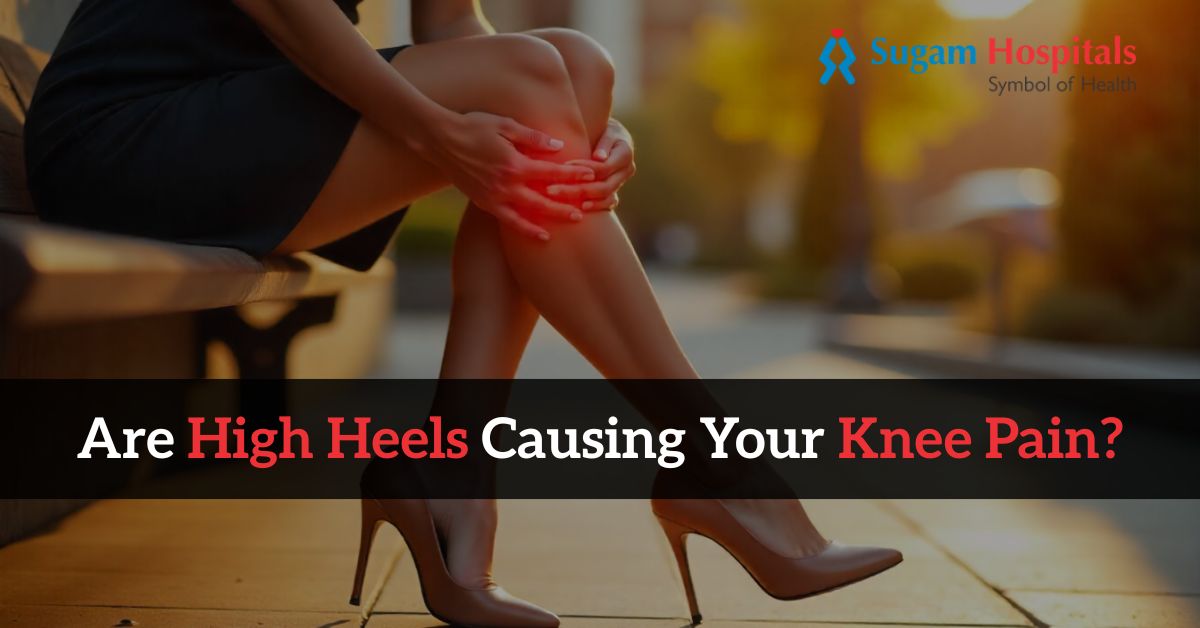Are High Heels Causing Your Knee Pain?

Are High Heels Causing Your Knee Pain?
September 17, 2025 by adminFashion generally comes with a price and in the case of high heels it may very well cost you your knees. They may complete your outfit and set you in a confident mood, but the danger lies in the prolonged use of heels, which changes the body’s natural posture and balance. The more you wear heels and the more consistent you are wearing them, the more you will start to increase tension on your joints, especially your knees.
A lot of women think any aches they feel when they start wearing heels are temporary and don’t give it much thought, but research shows that regular wearing of heels can lead to chronic knee issues if proper care is not taken.
How High Heels Affect Your Knees
The biomechanical construct of the human body is such that there is an even distribution of weight when standing or walking flat-footed. Heels disturb this balance by throwing the body weight forward onto the balls of the feet, encouraging slight extra flexion in the knees to keep the body upright. This increased flexion adds more pressure on the joints, especially on the inner side of the knees.
With time, this imbalance imposes microstriking effects on the cartilage and ligaments. What may start as a dull ache towards the end of the working week may tend to evolve into chronic ache, stiffness or swelling of the knees, especially in cases where heels have become regular wear.
The Link Between High Heels and Osteoarthritis
Frequent heel use can have many negative consequences; one of the most concerning is the possible osteoarthritis prevalence in women. Studies show that heels higher than two inches require the knees into an unnatural position, thereby increasing the wear on cartilage. Once the cushioning cartilage is gone, the bones can rub against each other; this is what causes the friction that leads to pain and limited flexibility.
Some early signs of wear on the joints are being unable to climb stairs, feeling sore after hiking or long walks or pains that are a heaviness around the knee. Without treatment, this continuous wear and tear can lead to great deterioration. The deterioration may be taking place without any symptoms until it is too far gone.
Other Impacts on Posture and Movement
The consequences of wearing high heels extend beyond the knees. Elevated heels will also affect the hips, lower back, and spine. They can create a chain reaction with the following effects:
- Hip and pelvic tilt: Wearing high heels advances the pelvis, changes the average position of the lumbar spine, stresses the pelvis and hip joints.
- Calf Muscle Tightness: The calf and thigh muscles shorten over time, creating a less flexible state, as well as an imbalance for walking on flat surfaces.
- Stress to the Spine: The altered gait pattern requires adjustment when walking in a heeled shoe format, increasing the forces applied to the lumbar spine, commonly leading to some sort of lower back discomfort.
All these inevitable changes do not only make walking less efficient, but more likely to result in injuries and chronic musculoskeletal conditions.
Can You Wear Heels Safely?
Giving up heels entirely may feel impossible to many people. Nonetheless, moderation and some smarter choices can help reduce the risks:
- Opt for lower heeled shoes: Shoes with heels under two inches tend to sit near natural body alignment.
- Choose supportive designs: Shoes with wider heels, cushioned insoles and proper arch supports help distribute weight in a more balanced way.
- Rotate out footwear: Switching between flats, sneakers and heels gives joints and muscles some time to recover.
- Stretch and strength: It’s vital to stretch, at least regularly, your calves, hamstrings and hips by couple your stretches with some strength work to your thighs, which would help balance out the strain.
Making some of these small choices and being mindful of how long you wear heels each day is a great way to care for your joints.
When to Seek Medical Advice
Knee pain is frequently dismissed as simply exhaustion. But ongoing pain can be a message we can’t ignore. Swelling, stiffness and/or inability to bear weight are signs that could mean something more and should be assessed by a healthcare professional.
While you might think, “It will be better tomorrow”, it may be a signal that your knee is worse off for wear and down the road, it may not be simple to treat! It is important to have your knee pain evaluated before it gets worse.
Sugam Hospital wants to help you before the pain progresses and you don’t know where to turn. Our orthopedic doctor Chennai believes that early diagnosis and prevention is important. Knee pain may be a result of your footwear, your alignment, or with an underlying condition. Our goal is to get patients on a treatment plan, which could consist of a combination of medical management, physiotherapy, and where required, surgery or advanced orthopaedic treatment.

